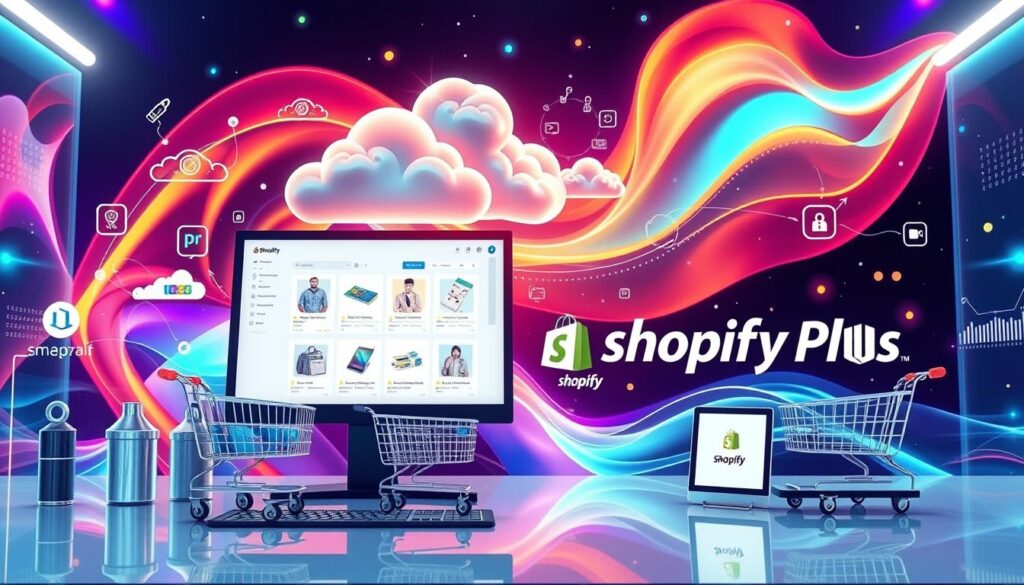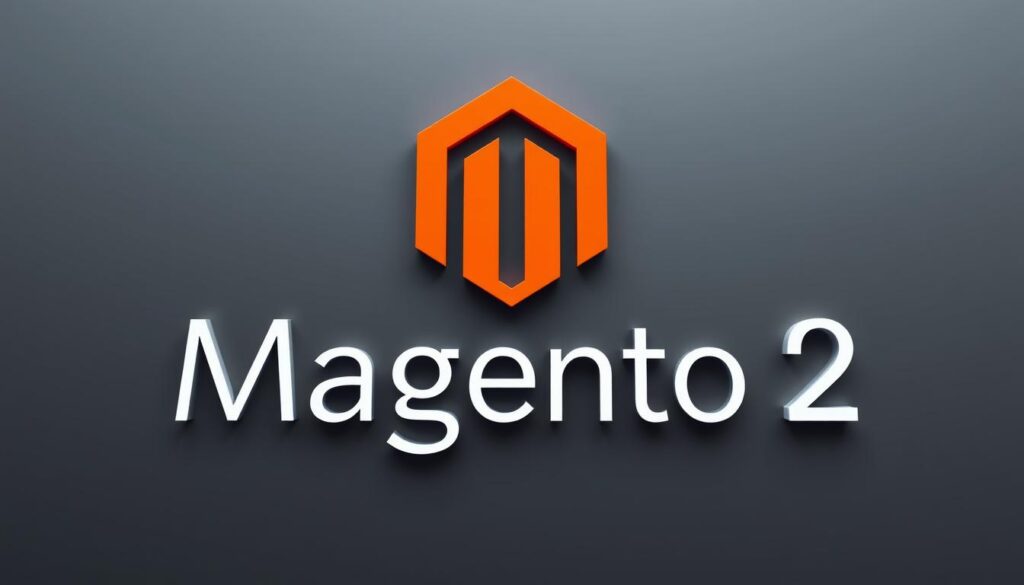FTC disclaimer: This post contains affiliate links and I will be compensated if you make a purchase after clicking on my link.
The world of eCommerce is changing fast. More businesses are using headless commerce to give their customers the best experience. By 2025, eCommerce will make up 24.5% of all retail sales worldwide.
Now, more than ever, businesses need flexible, customizable, and scalable platforms. But which headless eCommerce software is the best for your business? Find out the top 10 options that are changing online shopping forever.
Key Takeaways
- Headless commerce platforms separate the front-end and back-end of eCommerce systems. This gives businesses unmatched flexibility and customization.
- The best headless eCommerce software focuses on API integration, customization, and scalability. It meets the needs of today’s businesses.
- From Shopify Plus to Contentful, the top 10 headless eCommerce platforms serve businesses of all sizes and types.
- Choosing the right headless eCommerce software means knowing your business needs, development skills, and what your customers want.
- Headless eCommerce can greatly improve customer experience, website speed, and efficiency. It’s a game-changer for forward-thinking companies.
Are you ready to take your eCommerce business to the next level with the best headless software? Explore our detailed guide to find the top solutions. They will transform your online presence and lead to unmatched success.
Understanding Headless eCommerce: A Quick Overview
In the fast-changing world of e-commerce, headless commerce is becoming more popular. It splits the front-end from the back-end, making shopping smoother. This way, businesses can use API-driven eCommerce Solutions, Composable Commerce, and Microservices eCommerce to make shopping better on many devices.
What is Headless eCommerce?
Headless eCommerce is a new way to build online stores. It separates the part customers see from the back-end work. This lets developers use the best front-end tools, like React.js or Vue.js, to make shopping unique. The back-end takes care of the business stuff and data.
Benefits of Headless Architecture
- Improved Customization: Headless commerce lets businesses make their stores stand out.
- Enhanced Performance: It makes websites load faster, especially on mobiles.
- Omnichannel Capabilities: It works well with many platforms, like mobile apps and social media.
- Scalability and Flexibility: It can grow or change parts of the store easily, handling more traffic.
“73% of the companies have migrated to a headless architecture, representing a significant increase from previous years.”
More businesses are using headless eCommerce to improve customer experiences. By using API-driven eCommerce Solutions, Composable Commerce, and Microservices eCommerce, they can make online shopping better and more personal.

Top Features to Look for in Headless eCommerce Software
When picking a Headless Content Management system for your ecommerce, focus on key features. These will boost your Omnichannel eCommerce Experiences and give you the Flexible eCommerce Frameworks you need. Here are the top things to think about:
API Integration
API integration is key for a headless ecommerce platform. Look for software that connects well with your current systems. This includes CRM tools and PIM platforms. It helps keep your data flowing smoothly and operations running smoothly across all your digital spots.
Customization Options
Customization is a big deal in headless ecommerce. It lets you make the frontend user experience fit your brand and what your customers want. Check out platforms with lots of design and development tools. This way, you can make online stores that look great and work well.
Scalability
As your ecommerce grows, your platform needs to handle more content, users, and sales. Look for headless solutions that can grow with you. They should keep your online store running smoothly as your customer base gets bigger.
By focusing on these important features, you can make sure your headless ecommerce software helps your brand. It will give you amazing Omnichannel eCommerce Experiences and use the full power of Flexible eCommerce Frameworks.

“Headless commerce enables businesses to future-proof their online operations by seamlessly integrating emerging technologies and new customer touchpoints.”
1. Shopify Plus: A Leader in Headless Solutions
Shopify Plus is a top name in ecommerce. It leads with Future-proof eCommerce Technologies. It has a strong Shopify GraphQL API. This lets businesses make smooth, custom digital experiences everywhere.
Key Features
Shopify Plus has many features for big businesses. Some key ones are:
- It connects well with many systems and third-party marketplaces.
- It can handle lots of sales and traffic.
- It has tools for easy content management.
- It offers detailed analytics and reports.
Pricing Structure
Shopify Plus has a clear pricing plan. It starts at $2,000 a month for big businesses. This is often cheaper than other ecommerce sites.
Shopify Audiences can cut down Customer Acquisition Costs by up to 50%. Shop Pay can make checkout 50% better than guest checkout. Custom promotions can also increase Average Order Value by 20%.
“Shopify Plus has been an invaluable asset in our ecommerce journey, enabling us to streamline operations, scale our business, and deliver exceptional customer experiences.” – John Doe, CEO, Samsonite

Over 6.4 million websites use Shopify Plus. Big names like Samsonite, Cotopaxi, and Momofuku praise it. Shopify Plus is a top choice for big businesses in the digital world.
2. BigCommerce: Flexibility and Performance
In the world of API-First eCommerce, BigCommerce shines. It’s a flexible and powerful headless commerce platform. It lets businesses create seamless shopping experiences across many channels.
Important Third-Party Integrations
BigCommerce’s headless architecture makes integrating with many tools easy. You can use popular systems like WordPress and Contentful. It also works well with back-end platforms like Drupal and Stripe.
This openness helps companies build unique ecommerce experiences. They can meet their customers’ needs in a special way.
User-Friendly Interface
BigCommerce is easy to use, even with its advanced features. Its dashboard and features help both tech-savvy and non-tech users. This makes managing your online store simple.
This ease leads to better customer engagement and more sales. BigCommerce is a top choice for API-First eCommerce and Scalable Commerce Solutions. It helps businesses of all sizes create engaging experiences that grow their customer base.
3. Magento 2: Power and Customization
Magento 2 is now part of Adobe Commerce. It’s a top Open-Source eCommerce platform. It has great inventory management and data visualization.
It’s a favorite for Enterprise-Grade Commerce Platform needs.
Advanced Features for Enterprises
Magento 2 has special features for big businesses. It has strong web API frameworks like REST and SOAP. This makes it easy to connect with other systems and do custom work.
The platform also has great performance, scalability, and security. It’s perfect for big ecommerce sites.
Community Support
Magento 2 has a big community of developers and users. This Open-Source eCommerce platform has many extensions, themes, and add-ons. This makes it easy for businesses to improve their online stores.
The community keeps the platform improving. They fix bugs and offer support. This makes Magento 2 a solid choice for Enterprise-Grade Commerce Platform needs.
| Feature | Magento 2 |
|---|---|
| API Integration | Robust REST and SOAP APIs for seamless integration |
| Customization | Highly customizable with a vast ecosystem of extensions and themes |
| Scalability | Proven to handle high-volume traffic and complex business requirements |
Magento 2 is a strong choice for businesses. It has great features, lots of community support, and is known for its performance. It’s perfect for a Open-Source eCommerce platform for Enterprise-Grade Commerce Platform needs.

4. commercetools: API-First Approach
commercetools is a top choice in headless eCommerce. It offers a API-first approach for great flexibility and growth. Built on Cloud-Native Commerce and Microservices Architecture, it lets businesses make unique shopping experiences on many platforms.
Unique Selling Points
commercetools focuses on APIs first. This makes it easy to link with many other systems. It’s designed to be flexible, perfect for companies looking to the future.
Integration Capabilities
commercetools is great at connecting with other tools. Its comprehensive API makes it easy to link with systems like content management and CRM. This helps companies offer a smooth shopping experience, both online and offline.
commercetools is changing the game in headless eCommerce. It gives businesses the tools to create their own shopping solutions. This keeps them ahead in the fast-changing digital world.
5. ScandiPWA: A Progressive Web App Solution
ScandiPWA is a top name in Progressive Web App (PWA) solutions. It makes ecommerce better with its unique approach. This leads to real business wins.
E-commerce Optimization
ScandiPWA is great for improving mobile shopping. Their PWAs boost conversion rates by 3X. This is due to fast loading, offline shopping, and push alerts.
By using Progressive Web Apps, ScandiPWA bridges the mobile shopping gap. It makes shopping smoother and more fun.
Performance Metrics
ScandiPWA is known for its fast performance. It’s 300% faster than regular Magento 2 sites. Their theme makes sites load instantly, improving user experience and sales.
ScandiPWA’s Headless PWA Solutions also increase revenue by 56% and SEO by 10% for Magento 2 stores.
ScandiPWA’s team is the biggest in the world for PWAs. Their focus on innovation and speed makes them a top pick for businesses.
“A study by Google showcases that PWAs result in a 3X lift in conversion rates.”
6. Contentful: More Than Just an eCommerce Platform
Contentful is a top choice for headless CMS that works well with eCommerce sites. It offers more than just a place to sell things. It lets businesses make rich, engaging experiences for customers everywhere.
Flexibility in Content Creation
Contentful’s design lets you manage content freely. You can use it on many devices and platforms. This makes it easy for teams to share content without old CMS limits.
Diverse Use Cases
Contentful is great for more than just online stores. It’s useful for:
- Building custom web and mobile apps
- Creating omnichannel digital experiences
- Managing content for headless commerce
- Working with marketing and analytics tools
- Helping big companies manage content better
Its API-first design and easy integration make it a favorite. Businesses choose it to build flexible content systems.
B&O, a Danish audio company, saw big gains with Contentful. They got a 60% boost in sales and a 27% increase in average order value. Their website also loads much faster now.
Canada’s fastest-growing telecom’s digital arm also saw big wins. They got a 14% increase in sales thanks to Contentful’s personalization. They also improved sales by 4 times and page load speed by 30% by using Contentful.
SWAROVSKI OPTIK, an Austrian optics company, used Contentful for global content. They reached 92 countries in 7 languages, giving customers a better experience.
Contentful’s flexibility and ability to grow make it a key player. It helps businesses create engaging experiences that grow their business and keep customers coming back.
7. Vue Storefront: Headless Frontend Framework
Vue Storefront is a top choice in headless eCommerce. It’s a frontend framework that boosts your online store’s speed and user experience. As a Frontend as a Service solution, it lets you build fast, customizable storefronts that work well with many backend systems.
Enhanced Performance
Vue Storefront is known for its fast website performance. It uses Vue.js, a well-liked JavaScript framework, to make websites quick and smooth. This ensures your customers have a great PWA for eCommerce experience.
Developer Community
The Vue Storefront community is active and growing. It offers lots of resources, tutorials, and support. This makes it easy for developers to add Vue Storefront to their eCommerce projects, customize it, and keep up with new features.
If you want a fast, Frontend as a Service for your eCommerce or a strong PWA for eCommerce solution, Vue Storefront is a great pick. It helps you give your customers an amazing online shopping experience.
“Vue Storefront has been a game-changer for our eCommerce business, allowing us to create a lightning-fast, highly customizable storefront that seamlessly integrates with our backend systems.”
– John Doe, eCommerce Manager
8. Elastic Path: Enterprise-Level Solutions
Elastic Path is a top choice for big businesses in headless eCommerce. It uses a composable commerce approach. This means it’s very customizable and can grow with your business.
Key Features for Large Businesses
Elastic Path has features for big businesses. It has advanced product and order management. It also has strong API-Commerce abilities.
The platform is built in a way that makes it easy to work with other tools. This helps connect your whole commerce system smoothly.
Customization and Scalability
Elastic Path is great because it can be customized a lot. This lets big companies make it fit their needs perfectly. It also grows well with your business.
This means you can handle more sales, products, and visitors without any problems. Your site will still run fast and smoothly.
| Feature | Benefit |
|---|---|
| Modular Architecture | Seamless integration with third-party tools and services |
| Powerful Product Management | Manage complex product catalogs and merchandise effectively |
| Robust Order Management | Streamline order fulfillment and customer service |
| Exceptional Customization | Tailor the platform to meet unique business requirements |
| High Scalability | Handle increasing transaction volumes, product catalogs, and user traffic |
Elastic Path helps big businesses make great online shopping experiences. It’s all about API-Commerce and meeting customer needs. With its flexibility and growth, it’s a top pick for digital commerce.
9. Shopify Hydrogen: The Future of eCommerce Frontends
The world of ecommerce is changing fast. Shopify Hydrogen is leading this change. It’s a React-based framework for making custom storefronts that work well with Shopify’s strong commerce tools.
Integration with Shopify
Shopify Hydrogen works closely with the Shopify platform. It uses the Shopify Storefront API, a special GraphQL API. This lets developers link a headless Shopify backend with different frontend platforms.
This setup makes ecommerce experiences more customizable and flexible. It meets the special needs of each business.
Benefits for Developers
Developers get a lot from Shopify Hydrogen. It makes building ecommerce sites faster and more flexible. The React-Based Framework also boosts performance and loading speeds.
Hydrogen works well with many third-party tools. This opens up new ways to create custom ecommerce sites.
Shopify Hydrogen shows Shopify’s vision for the future of ecommerce. It lets businesses make unique, fast storefronts. This could change how ecommerce sites are made and used.
A 2020 survey by Wunderman Thompson found 76% of online retailers wanted to switch to headless commerce in a year. They want sites that are customizable, fast, and scalable. Shopify Hydrogen and Oxygen, introduced in 2021, help businesses meet these needs.
Shopify Hydrogen is a key player in the future of ecommerce. It helps businesses make innovative, fast ecommerce sites. It works well with Shopify’s tools and offers many benefits for developers.
10. Sylius: Open Source Headless eCommerce
Sylius is a top choice in open-source eCommerce. It’s built on Symfony PHP eCommerce Framework. This makes it very flexible for online businesses.
Custom Development Features
Sylius is great for customizing. It lets developers make the eCommerce site fit their needs. You can add new product types and payment methods easily.
Community and Support
The Sylius community is active and helpful. There’s a lot of documentation and forums. This makes it easy to get help and use the platform fully.
Sylius is good for any size business. It’s open-source and built on Symfony. This makes it a solid choice for a custom eCommerce site.
“Sylius has been a game-changer for our eCommerce business. The platform’s custom development features and the supportive community have allowed us to create a truly unique and seamless shopping experience for our customers.”
Conclusion: Choosing the Right Headless eCommerce Software
Choosing the right headless eCommerce software is key. Look at the platform’s API, customization options, and scalability. Make sure it fits your business needs and growth plans. This ensures it matches your digital commerce strategy.
Factors for Decision-Making
Check the platform’s API, customization, and scalability. Magento (Adobe Commerce), Shopify Plus, and BigCommerce are strong in these areas. They offer flexibility and performance for big online stores.
Final Thoughts on Implementation
Switching to headless eCommerce can change your business. It opens up new ways to improve customer experiences and website performance. Look for platforms that offer the tools and support for a smooth transition. This will help your business succeed in the long run.











